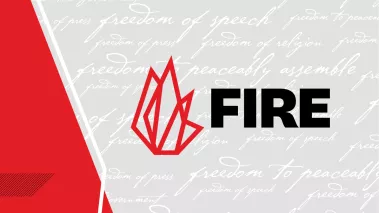Table of Contents
Back to School 2006: Newly Enhanced FIRE Resources Help Students 'Know Before They Go'

PHILADELPHIA, Sept. 7, 2006 — America’s colleges and universities are back in session, and the Foundation for Individual Rights in Education (FIRE) is ready with enhanced resources to fight abuses of power on campuses across the country. FIRE’s newly expanded Spotlight database, its Guides series, and its Student Kit will provide students with information about their rights and about violations of these rights on over 350 campuses nationwide. FIRE would particularly like to warn students at Johns Hopkins University (JHU), New York University (NYU), and Gettysburg College about ongoing threats to liberty on their campuses.
At JHU, FIRE is fighting to protect The Carrollton Record, a conservative student newspaper. JHU ignored the theft of approximately 600 copies of the paper and is currently investigating a “harassment” complaint that was filed against newspaper staffers after they published an article criticizing a student group. On Sept. 5, FIRE wrote JHU for the third time to demand that JHU cease the harassment investigation, condemn the theft of newspapers on campus, and restore TCR to the same rights that other campus papers enjoy.
FIRE also recently wrote NYU’s Board of Trustees protesting NYU’s decision to ban a student group from showing the Danish Mohammed cartoons as part of a public event organized to discuss the cartoons last spring. Months after the incident, NYU President John Sexton finally replied, denying any wrongdoing. FIRE has publicly responded to Sexton’s unwillingness to take responsibility for preventing the public display of the cartoons.
At Gettysburg College in Pennsylvania, FIRE continues to challenge an unjust sexual misconduct policy that requires “continuing and active” “verbal consent” for all sexual encounters, including touching, hugging, and kissing. The policy dangerously conflates an innocent hug with sexual assault and leaves students vulnerable to arbitrary punishment for normal behavior.
To ensure that students remain well-informed about the extent of their individual freedoms on campus, FIRE provides these comprehensive resources:
- FIRE’s Spotlight: The Campus Freedom Resource, which offers information on the state of liberty on America’s campuses. Students can use FIRE’s Spotlight to find pages for individual academic institutions, which contain links to our research of speech codes, materials from FIRE cases, media coverage of FIRE’s work, and entries from FIRE’s blog, The Torch. FIRE is also expanding Spotlight to provide information about threats to freedom of association and freedom of conscience on our nation’s campuses, including information on policies restricting the associational rights of student groups and on mandatory, ideological freshman orientation programs.
- FIRE’s Guides to Student Rights on Campus, a highly regarded series of primers on basic rights in higher education. Each Guide focuses on a specific area of student rights on campus, including free speech, religious liberty, due process, and student fees. FIRE’s Guide to First-Year Orientation and Thought Reform on Campus is particularly noteworthy for the new school year, as many students are required to attend orientation sessions that show precious little respect for individuality and the right of private conscience. While shedding light on each topic, the Guides also explain common administrative infractions and steps that may be taken to fight oppressive behavior. The Guides provide information about students’ rights and how to preserve them, as well as a basic understanding of the central tenets of a free society.
- FIRE’s Individual Rights Student Kit, which contains all the necessary tools for understanding student rights in higher education and for defending and asserting those rights. Each kit includes the newly released box set of FIRE’s Guides to Student Rights on Campus; a FIRE affinity identification card; a FIRE brochure describing how FIRE works and how it can help students; and one of three limited-edition posters advertising FIRE’s flagship publication, its Guide to Free Speech on Campus. FIRE has also launched a website dedicated to the Student Kit at www.campusrights.org.
“The more people know about their rights, the less vulnerable they will be to abuses,” said FIRE President Greg Lukianoff. “And if they do fall prey to abuses, they should never hesitate to contact FIRE. We stand ready to help.”
FIRE is a nonprofit educational foundation that unites civil rights and civil liberties leaders, scholars, journalists, and public intellectuals from across the political and ideological spectrum on behalf of individual rights, due process, freedom of expression, academic freedom, and rights of conscience at our nation’s colleges and universities. FIRE’s efforts to preserve liberty across America can be viewed at thefire.org.
CONTACT:
Greg Lukianoff, President, FIRE: 215-717-3473; greg_lukianoff@thefire.org
William Brody, President, Johns Hopkins University: 410-516-8068; wrbrody@jhu.edu
John Sexton, President, New York University: 212-998-2345; john.sexton@nyu.edu
Katherine Haley Will, President, Gettysburg College: 717-337-6010; will@gettysburg.edu
Recent Articles
Get the latest free speech news and analysis from FIRE.

VICTORY: Court vindicates professor investigated for parodying university’s ‘land acknowledgment’ on syllabus

Can the government ban controversial public holiday displays?

DOJ plan to target ‘domestic terrorists’ risks chilling speech
